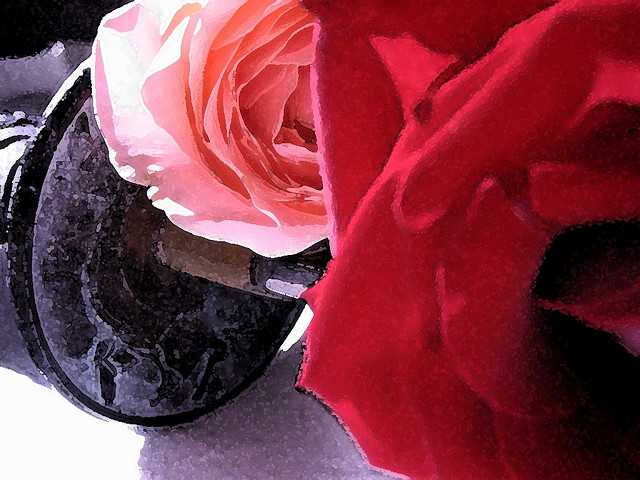FWP:
SETS == MUSHAIRAH; PETRIFIED PHRASES
JIGAR: {2,1}
PROPORTIONALITY: {6,4}
SWORD: {1,3}
For background see S. R. Faruqi's choices. This verse is NOT one of his choices; I thought it was interesting and have added it myself. For more on Ghalib's unpublished verses, see the discussion in {4,8x}.
The liver may be converted into blood by the lover's own suffering, as in the idiom 'to torment oneself, distress oneself' [jigar kā ḳhūñ pīnā] . Here, however, the liver is apparently slashed open by a sword, and that too is a proper part of the lover's passion: it 'opens a road' to the 'rose'. The rose of course is blood-red, so that the flowing of fresh blood may seem to create something like a channel or 'road' for 'rosiness' or 'the rose'. And the rose is also of course a well-established image of the beloved, so that the flow of liver-blood may facilitate her access to the lover's inmost depths.
The sword that makes this slash may, thanks to the powers of the iẓāfat , be a 'sword of the murderer' (who is presumably the beloved herself); or it may be a 'sword that is a murderer'-- a weapon that is 'murderous' and deadly in its killing power, and/or a semi-personified one that actually desires the lover's death the way a real murderer would.
But above all, this is a mushairah-verse. The first line is so broad in its possibilities that we can't really tell from it where the verse is going. Then in the second line, no real interpretation is possible until the last possible moment, when we get that excellent closural rhyme-word dil-kushā , a 'petrified phrase' that has its own witty complexities:
=It establishes the metaphorical 'exhilaration' or 'happiness' felt by the lover when the sword-stroke opens such a desirable rose-road inside him.
=It establishes the physical effects of the sword-stroke, which literally (and not just metaphorically) 'opens' the liver; on this see {209,4}.
=It introduces the 'heart' [dil], which
is the more restless, high-maintenance companion of the liver. But why would
what seems to be a wound in the liver, also be imagined as 'heart-opening'?
Ghalib himself has given the perfect reason: for the answer, and much discussion,
see {30,2}.

Asi:
That is, to the extent that the liver would be blood, it's as if it gives a road to the heart and makes roads for the heart. The truth is that the murderer's sword is extremely 'heart-opening'.
To call the murderer's sword 'heart-opening', or to versify the murderer's wound as 'heart-opening', is a theme invented by Mirza, which he has mentioned in a letter. He has used this same theme in Urdu and in Persian, and has also spoken of the liver, as in {209,4}.
== Asi, p. 54